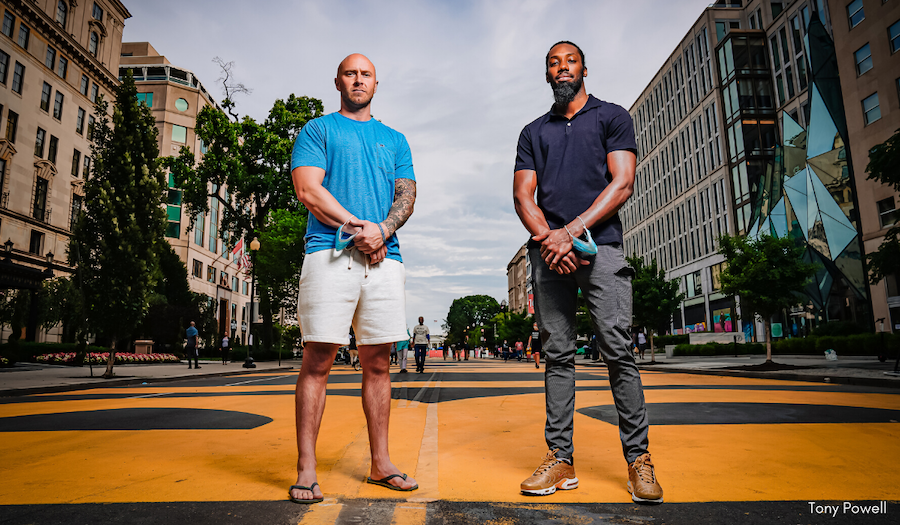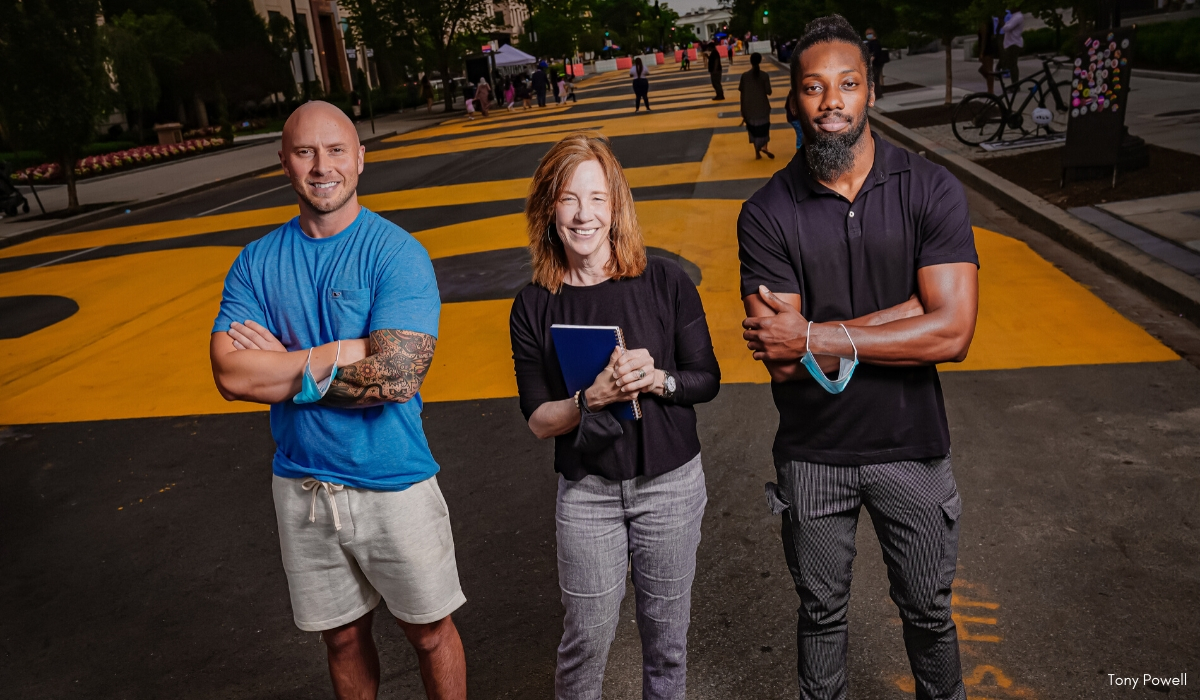Two Police Officers–One Black, One White–Reflect on the Murder of George Floyd and Our Country’s Time of Reckoning

In my long career as a writer, I’ve learned that sometimes stories just fall into your lap. Serendipity is a real thing in journalism–rare and true.
The very week my 31-year-old great-nephew, Ryan Moore, a police officer from Cape Cod, called to ask if I could put him up for a few days to attend the Washington D.C. Black Lives Matter protests, I came upon an article in the Washington Post about D.C. Officer Carlton Wilhoit. Carlton was featured in the Post after he took a knee and held a protestor’s hand during tense demonstrations in front of the White House in May.
Ryan is white and Carlton is black, and both come to this story of police and violence with personal trauma.
Two years ago this July, Ryan and his partner were both shot in pursuit of a suspect in East Falmouth, Massachusetts. It was a second shooting incident for Ryan, and he is in the process of receiving a disability retirement from the force. He’s now getting a BA in criminal justice in hopes of attending law school.
When Carlton was 21, he and his sister and a friend were pulled over in Oxon Hill, Maryland near his grandfather’s house. When Carlton asked the officers why they were being detained, he was forced out of the car, pepper-sprayed, and punched in the face. Later, when he got his driver’s license back it was cut in half.
The murder of George Floyd at the hands of police officers and the demonstrations that have swept the country in its aftermath have deeply affected both young men. Both graciously answered the same questions for me below and met each other at the Black Lives Matter Plaza in front of the White House on June 16.
1. What went through your mind when you first saw the video of the arrest and murder of George Floyd?
Ryan: When I first watched the video, I got the chills and shut my laptop. Usually I try and do my research before forming an opinion. I’ll read police reports, watch any videos available, try and place myself in someone else’s shoes, and listen to other perspectives, just to make sure I’m fully informed before I take a stance. The video of George Floyd’s arrest did not require that. George’s life was forcibly taken by a knee on his neck for eight to nine minutes as he yelled, “I can’t breathe,” with labored breathing. It’s almost too difficult to describe in words; it was incredibly awful.
I was a police officer in Massachusetts for about eight years and I felt ashamed that a police officer would do this. I’m still asking myself how could he think that was right?
Carlton: At first, I only saw a picture and it made me sick. When I got home from a shift and saw the video, I couldn’t finish it. When I finally did, I saw an officer who didn’t seem concerned about the welfare of George Floyd, his co-workers milling about like it was something they were used to. One had his hands in his pockets. It was a sadistic gesture. I remember thinking if you want to be an officer and you think this tactic is okay, I have to question your moral compass. Like in what world is this right? It gave me the chills, and I realized at that moment that the idea of police officers practicing good judgement and good care just took a million steps backwards.
2. How have the past several weeks of demonstrations affected you?
Carlton: I’ve been working the demonstrations pretty much nonstop. Those first days we saw a wave of anger and frustration with police brutality and injustices and I knew I’d be in the midst of it. Before I went downtown to work on Sunday, May 31, I spoke with a good friend for advice because I was angry and frustrated myself, but would not be able to show my own feelings because I’d be wearing my uniform. I’d be seen as part of the system and not an individual. He told me I just had to continue what I’ve been doing–bear the brunt of how angry everyone was–and that’s when I came up with the idea of being a sponge. I’ll take all that pain and frustration and soak it all in and when it’s time to wring it out I’ll put it into my work ten times harder. And that analogy helped me get through it.
That was the day I kneeled with a protestor and we had a conversation–it was like a roundtable discussion with about 60 people. They gave their opinions and concerns and it was really transformative. I wasn’t expecting that. I realized people there didn’t want to destroy anything; they wanted answers. They wanted us officers, especially officers of color, to understand.
At that moment I knew I had to be a super strength sponge! After those first few days everything seemed to calm down. After the anger it seemed like it was time to organize and keep up the protests to show we mean business. The transition has been such a beautiful thing. And my own speaking out as a black officer is my right. You can’t be neutral with something that’s completely wrong when you’re supposed to stand for everything that’s right.
Ryan: The past few weeks have really been stressful. I was already thrown off by the social distancing and restrictions, and now it’s been compounded with George Floyd’s death. My TV and social media are nonstop coverage of everything going on, and the violent ones are what I find most disturbing. The police being violent and people demonstrating becoming violent alike.
The videos with officers being hurt I can relate to personally. I remember what it felt like that day I was shot and still suffer from the traumatic effects, so I hate to see another officer go through what I did. I also have friends and family still working as police officers, and I worry they may be mistakenly characterized. Then I see videos of more police making poor decisions which just adds to the anger and rage already directed at them. But I also love that we live in a country that allows free speech, peaceful protesting, and demonstrations. It’s what makes our country great and gives me pride in protecting the community I serve. I hope that the people protesting against police brutality and racism also understand that not all police are bad–that the majority of us are good people, with big hearts, who probably have a lot in common with the people protesting. It saddens me to see such a strong divide between the police and the community, and the divide seems to grow further every day. Now that I’m back in school, I’ve learned more about the statistics in our criminal justice system and the racial disproportionality, but I don’t have first-hand experience to truly understand the issue. I’m a former white police officer living and working on Cape Cod. Obviously, I can’t relate to being racially profiled or discriminated against because of my race, which is why I came to D.C. to see the protests for myself.
I want to hear people speak about their own experiences, how they have been discriminated against or victimized by the police, which I think is something that is lacking in society today. Many people are stubborn with their own beliefs, are ignorant to facts, and refuse to listen to other opinions.
3. How do you feel when you hear the phrase "defund the police"?
Ryan: From what I’ve read there appears to be a spectrum that doesn’t hold one true meaning. On one extreme end, there are calls for entire departments to be dissolved. I think reform does need to take place in certain areas like internal policies and procedures, but abolishing police or simply reducing the number of officers doesn’t address the actual problems that created this discussion. Many conversations about “co-dispatching” police officers with social workers is a great progressive idea. At least in my experience, I’ve always felt we had to fulfill too many different roles as an officer; addressing addiction, homelessness, mental illness, etc. I think our community could be better served with specialists trained in those specific fields with a carefully prepared and well thought out approach to policy reform.
“Divest and Invest” is a popular phrase, too. I worry some of these changes are emotional responses, albeit caused from a tragic incident that has shed light on a significant problem in policing without taking the time to make sure these reform proposals will be successful. However, if there is opportunity to redirect funds elsewhere that will improve police-community relations without any negative consequences, I think most police would support that.
Carlton: I can see an examination of how funds are allocated is important–maybe more money could be focused on sensitivity training, implicit bias training, and de-escalation tactics. At the end of the day, though, there are certain things we deal with that I don’t think someone who hasn’t been properly trained as a police officer could handle. But things other agencies could handle–homelessness, addiction, mental health issues – I’m all in.

Before they parted Carlton gave Ryan a pin of a human heart.
He ordered a hundred of them after the death of George Floyd and has been handing them out every chance he gets. “I didn’t want the cliché of a valentine heart, rather one where you see the actual veins” he says. “It was super intentional. This heart actually represents life. I wanted to make sure that the people in my community know that I value them and their lives.”
Grace and serendipity at Black Lives Matter Plaza. Special thanks to Carlton and Ryan. For their service and for their big hearts.

This Q&A was featured in the June 28th edition of The Sunday Paper. The Sunday Paper inspires hearts and minds to rise above the noise. To get The Sunday Paper delivered to your inbox each Sunday morning for free, click here to subscribe.


